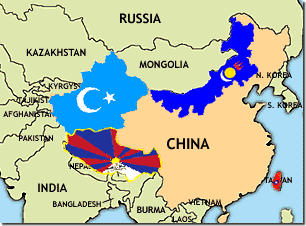|
|
|
Brief Introduction to East Turkistan and
Uyghurs
East
Turkistan, also known as Xinjiang Uyghur Autonomous Region of China, lies in the
heart of Asia. The current territory of East Turkistan is1,626,000 square
kilometers (635,000 square miles)-4 times the size of California. It was
1,820,0000 square kilometers in 1949 according official records. The lost part
of the land was annexed by Qinghai and Gansu provinces of China after the
Chinese communists invaded East Turkistan in 1949.
East Turkistan is the homeland of the
Turkic speaking
Uyghurs
and other central Asian peoples such
as Kazaks, Kyrgyz, Tatars, Uzbeks, Tajiks. According to the
latest Chinese census, the present
population of these Muslims is slightly over 11 million, among this, the 8.68
million Uyghurs are the majority. Unofficial
statistics by Uyghur sources put the Uyghur population Around 15-20 million.
Historically, East Turkistan is part of Central Asia, not of China. East
Turkistan people are not Chinese, they are Turks of Central Asia.
Located on the famous Silk Road, Uyghurs played an important role in cultural
exchanges between the West and East, and developed a unique culture and civilization of their own.
The Manchu Empire invaded East Turkistan in 1876 and formally annexed East
Turkistan into its territory and renamed it "Xinjiang" meaning "New Territory"
or "New Frontier" on November 18,1884.
After the Manchu Empire was
overthrown by the Chinese Nationalists in 1911, East Turkistan fell under the
rule of the nationalist Chinese government. The Uyghurs, who also wanted to free
themselves from foreign domination, staged numerous uprisings against
Nationalist Chinese rule and twice, in 1933 and 1944, succeeded in setting up an
independent East Turkistan Republic.
The second East Turkistan Republic which remained independent for 5 years fell
under the rule of Communist China in 1949 after its top leaders were
killed in a mysterious plane crash on their way to a meeting with the Chinese
president Mao Tsedong. Since then the communist China has been exercising a
colonial rule over East Turkistan.
more...